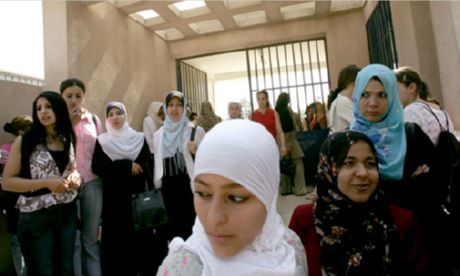A rating of countries where it is not safe for women to live
Last reviewed: 23.04.2024

All iLive content is medically reviewed or fact checked to ensure as much factual accuracy as possible.
We have strict sourcing guidelines and only link to reputable media sites, academic research institutions and, whenever possible, medically peer reviewed studies. Note that the numbers in parentheses ([1], [2], etc.) are clickable links to these studies.
If you feel that any of our content is inaccurate, out-of-date, or otherwise questionable, please select it and press Ctrl + Enter.

While the world is slowly taking steps towards the final establishment of gender equality, one unsettling issue remains unresolved: the safety of women. Even in the developed world, a significant proportion of the female population do not feel safe, especially at night.

A new Gallup study shows that in countries such as the United States, where 82% of men feel comfortable walking at night, only 62% of women can claim the same thing.
The least secure countries in the world for both sexes are for the most part the war-ravaged regions in the Middle East, Eastern Europe and Africa. In these countries, men and women do not equally feel protected.
This trend is also true for developing countries, but here the gap between men and women begins to increase.
Based on a Gallup report, the 24/7 Wall St. Considered 10 countries where the gap between the safety of life of men and women is the largest.
1. New Zealand
- Women who feel less secure than men: 35%
- Women who feel safe at night: 50%
- Men who feel safe at night: 85%
Most of the indicators of gender equality, except for security indicators, are in New Zealand at a high level. The World Economic Forum gives New Zealand the fourth place in the rating on the problem of gender equality.
In terms of employment prospects, the proportion of men working full-time is only slightly higher than women: 66% for men and 64% for women. Regarding participation in political life: 32.2% of members of parliament are women.
Such evidence seems to indicate that there is no violence in the life of women of this island. But statistics refutes this error: in 2009, there were 30.58 incidents per 100,000 people, and the country ranked seventh in the frequency of rapes from 94 countries.
In 2011, the United Nations named New Zealand among the worst countries regarding cases of domestic violence.
2. Algeria
- Women who feel less secure than men: 34% (divides 2nd place)
- Women who feel safe at night: 32%
- Men who feel safe at night: 66%
Less than a third of the women of the North African country of Algeria feel safe at night. This is the fifth worst indicator in the world. While the proportion of men working full-time compared to women working full-time is almost identical, other indicators of gender equality are not so optimistic.
Only 8% of women are represented in parliament. According to the UN, the percentage of rape per capita is relatively small, but reporting may not reflect the truth.
Representatives of the international organization Amnesty International state that the rights of women in the country are marginalized. There are a lot of unresolved issues regarding violence against women and their rights "subordinate to men in matters relating to marriage, divorce, custody of children and inheritance."
3. Malta
- Women who feel less secure than men: 34% (divides 2nd place)
- Women who feel safe at night: 48%
- Men who feel safe at night: 82%
In the 2010 report, the UN Committee on the Elimination of All Forms of Discrimination against Women criticized the approach to women's rights and their security in Malta.
The report expresses concern that domestic violence has been a constant problem in the country and that Maltese sociocultural relations continue to tolerate violence in the family. Nevertheless, some progress was achieved when in July 2011 the Parliament of Malta legalized the divorce.
 [1]
[1]
4. Cyprus
- Women who feel less secure than men: 28% (on the 4th)
- Women who feel safe at night: 57%
- Men who feel safe at night: 85%
The percentage of women employed in Cyprus has increased substantially over the past year: 74% of women have full employment compared to 78% of men.
Nevertheless, the unemployment rate among men-Cypriots was half that of women: only 3% compared to 6% in 2011. In many other areas, the situation of women in the country also remains highly ambiguous.
The political participation of women is limited: only 10.7% of the members of the Parliament of Cyprus are women. They occupy only 9% of ministerial posts. The unequal status of women extends to many aspects of their lives in Cyprus that negatively affect safety. According to the US Department of Commerce in 2010, Cyprus is the "final destination" in the chain of sex trade.
 [2]
[2]
5. Italy
- Women who feel less secure than men: 28% (in 4th place)
- Women who feel safe at night: 40%
- Men who feel safe at night: 68%
When it comes to gender equality, Italy's performance is exceptionally low. Only 56% of women are fully employed, compared to 69% of Italian men.
This 13% gap in employment is one of the largest in the world. Italy also has a mediocre Gender Index of 2011: from 0,6796 points it occupies the lower part of the list from 135 countries of the world. The composite index is the degree of women's participation in economic activities, their achievements in education, medicine and politics.
When it comes to safety, gender inequality is especially scathing: only 40% of Italian women feel safe compared to 68% of men.
6. Albania
- Women who feel less secure than men: 27% (divides 6th)
- Women who feel safe at night: 54%
- Men who feel safe at night: 81%
While more than four out of five men in the country feel safe at night, only more than half of women can claim the same.
The volume of actual violence against women in the country is difficult to determine. According to the UN, per capita rape is below the world average. Nevertheless, the country accounts for more than 80 murders per 100 thousand of the population - one of the highest rates in the world.
A high level of violence shows that the figures for rape may be underestimated. According to Amnesty International in Albania, there is a serious problem with domestic violence, as well as trafficking in women for the purpose of enforcing prostitution.
7. Australia
- Women who feel less secure than men: 27% (divides 6th)
- Women who feel safe at night: 51%
- Men who feel safe at night: 78%
Less than half of women in Australia feel safe at night. The reason becomes obvious if one observes the statistics of rape in the country: in 2009, 91.92 rapes per 100,000 people were registered in Australia, which is the highest in the world.
In 2011, the Australian government adopted the National Plan and a program to reduce violence against women and their children.
According to the Australian Government's website for the program, one in three Australian women becomes a victim of physical abuse, and almost one in five is a victim of sexual violence aged 15 and over.
8. The United States
- Women who feel less secure than men: 27%
- Women who feel safe at night: 62%
- Men who feel safe at night: 89%
Despite the high GDP in the US, the level of personal safety of women here is extremely low. According to the UN, 88,097 cases of rape in the US in 2009 - more than it was recorded in any other country in the world from the UN surveyed.
And these are only registered cases. One in six American women faces rape, incest or domestic violence.
 [3]
[3]
9. France
- Women who feel less secure than men: 27%
- Women who feel safe at night: 51%
- Men who feel safe at night: 78%
Less than half of France's women feel safe when they go out at night, compared to almost 80% of men who feel safe.
According to the CIA World Factbook report, almost 85% of the country's population lives in urban areas. In many respects, France is one of the most developed countries in the world. Here, more than 98% of residents receive secondary education.
However, in 2009 there were more than 10 thousand registered cases of rape. This is one of the worst indicators in the world.
10. Finland
- Women who feel less secure than men: 26%
- Women who feel safe at night: 66%
- Men who feel safe at night: 92%
In Finland, 80% of women work full-time, while only 68% of men are fully employed. Nevertheless, when it comes to personal safety, they feel less secure than men. Although the lowest crime rate in the EU is registered here, only 66% of Finnish women are not afraid for their safety at night.
In its report for 2012, Amnesty International criticizes the Finnish state for not providing enough shelters and clinics for victims of rape and domestic violence.
